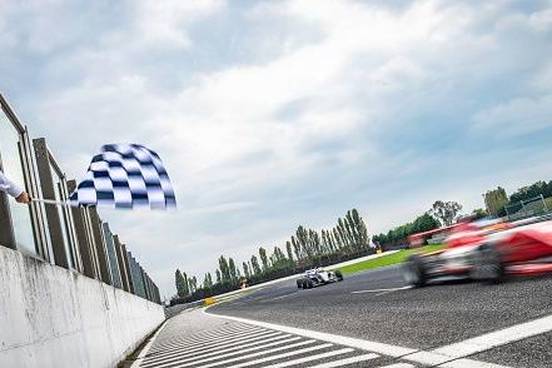
Homestretch
The homestretch is the straightaway portion of the track starting with the final turn and ending with the finish line. A stretch is one of the straight sides of the course, as heard in the common horse-racing announcement “Down the stretch they come.”
Homestretch is often used figuratively to refer to the final stage of a process.
Construction of Port Canaveral's massive Cruise Terminal 3 complex is entering the homestretch. So port and construction company officials were anxious to show off the progress Wednesday on the $163 million project — the largest in the port's history.
— Dave Berman, USA Today, 16 Jan. 2020

Marathon
The race known as a marathon gets its name from the Greek plain that was the site of the Battle of Marathon, between armies from Greece and Persia, in 490 B.C.
Marking the end of the First Persian Invasion of Greece, the victory by the Athenians forced the retreat of the Persian army to Asia. According to legend, news of the Greek victory was delivered to Athens by a runner named Pheidippides, the distance between the two sites amounting to the approximate length used for the modern marathon.
An Alaska native, Youngren ran her first marathon at the 2017 Equinox Marathon in Fairbanks in 4:48, on a course with an unforgiving 3,285 feet of elevation gain and loss. Despite the difficulty and cramping, she credits that race as the one that got her hooked on the 26.2-mile distance.
— Chris Chavez, Sports Illustrated, 13 Feb. 2020
While certain details of this legend, attributed to Herodotus, are in question, we are pretty confident that Pheidippides affixed a 26.2 sticker on the back of his car.
The word marathon gives its second half to a number of portmanteaus for similarly long, drawn-own events, such as telethon.

Grand prix
Grand prix translates literally as “grand prize,” and can refer to any number of different races, but the original one was the Grand Prix de Paris, an international horse race established in 1863.
The association with horses continues in uses of the term to refer to the highest level of equestrian competition:
The horse shows featured several top grand prix riders and competitors from across the state and the country, including participants from Orlando, St. Augustine, Tennessee and Texas.
— Alex Kushel, The South Florida Sun-Sentinel, 22 Aug. 2019
The term’s strongest association with racing might come from the Monaco Grand Prix, a Formula One motor race held every May on city streets in Monte Carlo, in the principality of Monaco.
That association has caused the name to be bestowed upon similarly styled races:
The first Grand Prix of Boston is scheduled for Labor Day 2016, but has faced heavy opposition from several groups up until now. The Seaport Lofts Condominium Association worried the race would have a negative effect on the neighborhood, as the proposed racecourse would send the cars careering past residential buildings.
— Lloyd Mallison, Boston.com, 20 Nov. 2015

Pit stop
The pits are the areas alongside an auto racecourse for drivers to pull in during the race for fuel and repairs. Pit can also refer to a hole in the floor of a garage or workshop that allows a mechanic access to the undercarriage of a car.
A long pit stop means time lost in the race, so most pit stops are brief. Hence we use pit stop playfully for any kind of break or stop made during a longer journey.
Before I moved to Colorado from North Carolina, I made a pit stop in Ohio to see my parents—a Midwest reality check of steel mills and gray skies, in between oceans and mountains.
— Bridget Callahan, Sierra Magazine, 14 Sept. 2019

Also-ran
You might be familiar with also-ran from its use in politics, as it refers to candidates that either don’t win an election or don’t capture a nomination.
In a few days, the first contest in the 2020 Democratic presidential primary season, the Iowa caucuses, will be in the books. The moment the caucuses are over often sets off a scramble as its winner goes on a victory lap in donors’ email inboxes and the also-rans waver between spinning and dropping out.
— Philip Bump, The Washington Post, 30 Jan. 2020
The term originates in horse and dog racing for competitors that don’t achieve any of the top three finishes. In a list of final results, the words "also ran" would appear over the names of those competitors that did not finish in the money. It’s far from the only term that politics borrows from horse racing. Another is dark horse, used in both fields for a little-known contender that makes a surprisingly good showing.

From scratch
Scratch is a term historically used in a number of sports (such as boxing) to mark a starting point. The notion comes from such a line being scratched into the earth, likely from when races were held on soft terrain.
A runner starting from scratch was not given a head start; applying the same idea to other sports, a scratch golfer or scratch bowler is one good enough to play without having their score adjusted with a handicap. Hence, to make something from scratch is to do so without any kind of head start, such as with premade ingredients:
Salguero’s pupusas are entirely made from scratch. He starts with soaked corn that he mills and makes into masa. Then, he shapes the masa by hand around fillings, like cheese, mushrooms and braised pork shoulder, before cooking the flattened rounds on a comal.
— Momo Chang, Berkeleyside.com, 14 Feb. 2020

Jump the gun
The “gun” in jump the gun of course refers to a starter’s pistol, used in many kinds of races. To jump the gun means to start the race ahead of the official’s signal, usually leading to disqualification.
Similarly, to jump the gun means to do something before the proper time to begin has been reached:
The Massachusetts market is exploding. It is hard to think a larger premium can’t be had. It is worth noting that, according to RFP rules, the town might have jumped the gun, listing the RFP before having the authority from the town’s constituents.
— Ed Whitaker, The Greenfield Recorder, 2 May 2019





